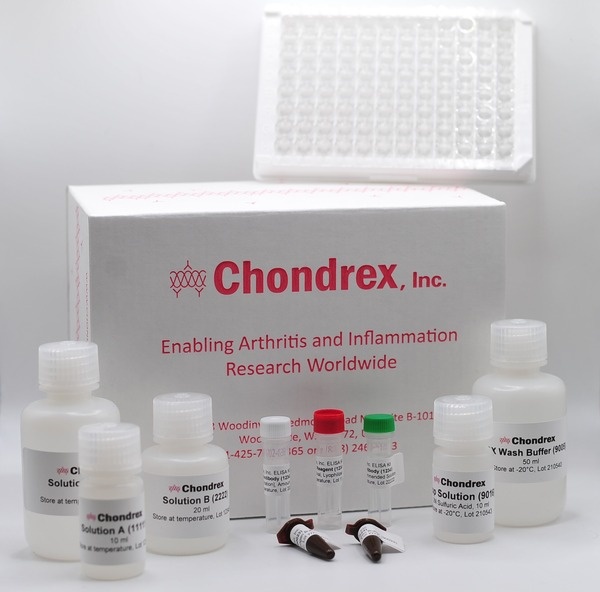The translocation of intestinal bacteria and their toxins may be a significant contributing factor in the pathogenesis of autoimmune diseases. This hypothesis has been considered valid for some time (1-6) though not extensively investigated due to the lack of useful tools. Indeed, studies indicate that events such as stress, surgery and minor GI disorders significantly increase the mucosal permeability, and as a result, significantly increase the translocation of bacteria from the intestinal mucosa into the body (7-9). Chondrex, Inc. provides fluorescent-labeled dextrans and a D-xylose assay kit to evaluate the permeability of semi-permeable membranes to macromolecules in vivo and in vitro.
Permeability Evaluation Kit
| Product | Catalog # | Price (USD) | |
|---|---|---|---|
 |
D-Xylose Assay Kit | 6601 | 181.00 |
Permeability Evaluation Solutions - Fluorescent Labeled Dextrans
| Product | Molecular Weight | Quantity | Catalog # | Price (USD) | |
|---|---|---|---|---|---|
 |
FITC-Dextran, 4 kDa | 4 kDa | 25 mg/ml x 5 ml | 4013 | 119.00 |
 |
FITC-Dextran, 40 kDa | 40 kDa | 25 mg/ml x 5 ml | 4009 | 119.00 |
 |
TRITC-Dextran, 70 kDa | 70 kDa | 25 mg/ml x 5 ml | 4014 | 199.00 |
Permeability Routes
In general, the passage of molecules from the gut into the body occurs either in between the cells or through the cells, paracellulary or transcellulary, respectively. Fluorescent-labeled dextrans provide a simple and reliable method for evaluating the paracellular permeability of semi-permeable membranes in vitro and in vivo. Alternatively, D-xylose is used to measure transcellular permeability, more specifically passive carrier-mediated uptake in the small intestine where absorption occurs.

FITC-Dextran
Several studies have shown an increase in bacterial translocation in response to various triggers such as stress (7, 8). Fluorescent-labeled dextrans offer a simple tool for the evaluation of semipermeable membrane function. With regard to the molecular weight of the FITC-dextran (40 kDa), it has been shown in E. coli that the majority of its proteins are in the mass range of 25-120 kDa, which suggests that the most biologically significant proteins are in this range (10). Therefore, Chondrex, Inc. provides 40 kDa FITC-Dextran as a biologically relevant macromolecular marker for the evaluation of semi-permeable membranes in vivo and in vitro.
Assay Workflow

A standard curve made with FITC-Dextran diluted in PBS

References
- Aoki S, Y.K., Yokoyama T, Nonogaki T, Iwasaki S, Mitsui T, Niwa S., Role of enteric bacteria in the pathogenesis of rheumatoid arthritis: evidence for antibodies to enterobacterial common antigens in rheumatoid sera and synovial fluids. Ann Rheum Dis., 55: 363-9 (1996).
- Peltonen R, Kjeldsen-Kragh J, Haugen M, Tuominen J, Toivanen P, Førre O, Eerola E. Changes of faecal flora in rheumatoid arthritis during fasting and one-year vegetarian diet. Br J Rheumatol, 33: 638-43 (1994).
- Peltonen R, N.M., Helve T, Hänninen O, Toivanen P, Eerola E. Faecal microbial flora and disease activity in rheumatoid arthritis during a vegan diet. Br J Rheumatol, 36: 64-8 (1997).
- Terato K, Harper DS, Griffiths MM, Hasty DL, Ye XJ, Cremer MA, Seyer JM. Collagen-induced arthritis in mice: synergistic effect of E.coli lipopolysaccharide bypasses epitope specificity in the induction of arthritis with monoclonal antibodies to type II collagen. Autoimmunity, 22:137-47 (1995).
- Vaahtovuo J, Munukka E, Korkeamäki M, Luukkainen R, Toivanen P. Fecal microbiota in early rheumatoid arthritis. J Rheumatol, 35(8):1500-5 (2008).
- Van der Heijden, IM Wilbrink B, Tchetverikov I, Schrijver IA, Schouls LM, Hazenberg MP, Breedveld FC, Tak PP. Presence of bacterial DNA and bacterial peptidoglycans in joints of patients with rheumatoid arthritis and other arthritides. Arthritis Rheum, 43:593-8 (2000).
- Anderlik P, Szeri I, Bαnos Z, Barna Z. Bacterial translocation after cold stress in young and old mice. Acta Microbiol Hung, 37:289-94 (1990).
- Velin AK, Ericson AC, Braaf Y, Wallon C, Söderholm JD. Increased antigen and bacterial uptake in follicle associated epithelium induced by chronic psychological stress in rats. Gut, 53:494-500 (2004).
- Khalif IL, Quigley EM, Konovitch EA, Maximova ID. Alterations in the colonic flora and intestinal permeability and evidence of immune activation in chronic constipation. Dig Liver Dis, 37: 838-49 (2005).
- Chong BE, Wall DB, Lubman DM, Flynn SJ. Rapid Profiling of E. coli Proteins Up to 500 kDa from Whole Cell Lysates Using Matrix-assisted Laser Desorption/Ionization time-of-flight mass Spectrometry. Rapid Commun Mass Spectrom, 11(17):1900-8 (1997).